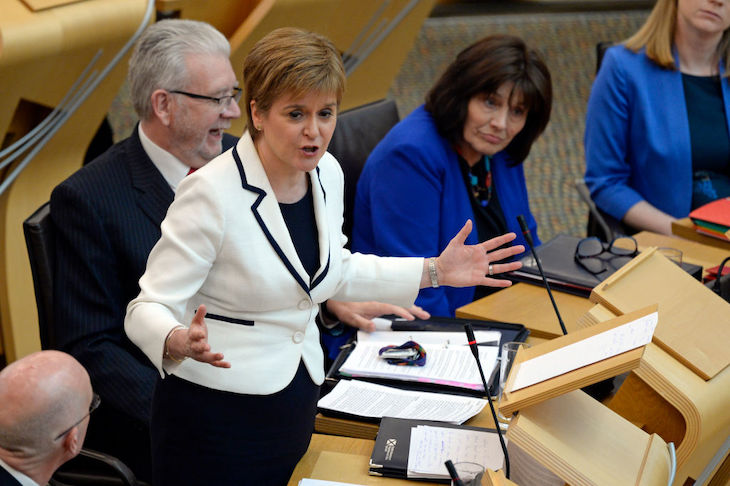Nicola Sturgeon is a reader and, to judge by the statement she has just made to the Scottish parliament on the implications of Brexit for Scotland’s future, the book she’s been reading lately is ‘The Gentle Art of Letting People Down Gently’. The people being, in this instance, the SNP members preparing to attend the party’s conference in Edinburgh this weekend.
Of course many headlines will focus on her suggestion that Scotland should, given the wreckage of Brexit and the manner in which Scotland still faces being withdrawn from the EU against its will, enjoy a new referendum on independence before the next Holyrood elections in 2021. That is a possibility that must always remain on the table. And it might happen yet.
But this was not a statement promising any such plebiscite. On the contrary, it was a measured, low-key, plea for supporters of all parties (and none) to think again about their country’s future. The First Minister has learnt some lessons from Brexit and one of them is that a narrowly-won referendum settles much less than you might think.
So the subtext of this statement was, in essence, ‘We need to be in a winning position – a clearly winning position – before we do this again and we are not there yet’. This is not just prudent, it may even be wise. Sturgeon believes, I think, that any second referendum should, in effect, confirm Scotland’s desire for independence, not decide it. That way she can bring most of the country – as distinct from a very narrow majority – with her.
Hence her talk of consensus-building, her plea for other parties to come up with proposals that would strengthen the Scottish parliament or better-satisfy the growing constitutional aspirations of the Scottish people, her suggestion that a Citizen’s Assembly be convened to explore, in broad terms, the essential question ‘What kind of country do we want to be?’
This First Minister is not a natural gambler. On the one hand she accepts that the ongoing Brexit calamity makes it all but impossible to make an ‘informed choice’ on Scotland’s future any time soon; on the other that choice ‘cannot wait forever’. Hence her desire for a vote by May 2021. But the latter consideration is plainly subordinate to the former; a referendum as soon as possible is not the same as a referendum soon.
And it is difficult to see how a referendum could be held in a situation of any great clarity until such time as the future relationship between the UK and the EU is determined. Because that relationship necessarily informs the future relationship of an independent Scotland to both the UK (its largest trading partner) and the EU (in such a scenario, its safest harbour).
But the troops need something to chew on, even if it is a very meagre bone indeed. So Sturgeon announced that she will shortly introduce legislation at Holyrood that would set the framework for the rules under which any second referendum might be fought. That’s fine. Opposition parties will grumble this takes time away that should really be spent on health and education and who knows what else but, as moves towards a referendum go, this is a small one. Notably, the First Minister accepted there is little point in asking for a Section 30 order that would establish the legal basis for a referendum but that would, at present, be summarily dismissed by the UK government.
Admittedly this government may not be with us for all that much longer, at which point circumstances might change all over again. Even so, it seems worth noting that this was a grievance card the First Minister chose not to play. Asking for a Section 30 order but not receiving it would stir-up the true believers – Scotland ignored! Scotland slapped-down! Scotland told to get back in its box and shut-up! – but it would guarantee the kind of rancour and discord that hardens attitudes both for and against independence. Even grievance-mongering is subject to the laws of diminishing returns when it provokes a shake of the head and the muttering of ‘There she goes again’.
Nicola Sturgeon argues that ‘the case for independence is even stronger now given the profound changes that have taken place in the UK since 2014’ and, on a theoretical level, there is something to be said for this. Nevertheless, she is aware that this is not, at least not yet, a sentiment shared by a majority of her countryfolk. And so, for all that the headlines may scream otherwise, this was a holding statement not a clarion call for a new referendum. Neither the SNP nor the country is ready for that and this is something Nicola Sturgeon, I think, understands.
‘If the status quo is not fit for purpose’, Sturgeon asked, ‘how do we fix that?’ And ‘can we do so in ways that maximise consensus rather than amplifying differences?’ The short answer to that second question is ‘No’ but the longer-term answer is more interesting: it is about building the sense that Scotland has tried, that Scotland has done all it could, to accommodate itself to life within the United Kingdom but that – sadly! – this is no longer possible. Neither Westminster nor the UK as a whole can give Scotland the tools and the freedom she needs and as this road comes to an end, so another path must be taken.
That, too, is a means by which I believe, slowly but steadily, Sturgeon hopes to build a moral argument for independence that will, one day, trump concerns or worries or fears about its practical implications. That is a longer game and one that will not be finished during this parliament. Nicola Sturgeon has a lifelong belief in one radical policy but that does not make her a radical.







Comments